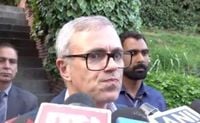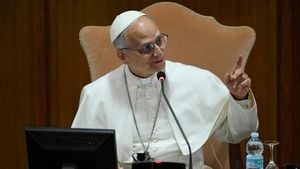On Saturday, May 10, 2025, Jammu and Kashmir Chief Minister Omar Abdullah welcomed the "full and immediate" ceasefire between India and Pakistan, which comes after two days of cross-border attacks that resulted in significant loss of life and infrastructure damage. Abdullah expressed his relief, stating, "Better late than never, but had this understanding come two or three days earlier, perhaps the bloodshed we saw and the precious lives we lost would have been safe." This sentiment was echoed by many who felt the urgency for peace following a period of intense military clashes.
Earlier that day, foreign secretary Vikram Misri confirmed that the Directors General of Military Operations (DGMO) from both countries had agreed to cease all military operations on land, air, and sea starting at 5 PM IST. Misri stated, "Today, instructions have been given on both sides to give effect to this understanding. The Directors General of Military Operations will talk again on May 12 at noon." This announcement followed a long night of talks mediated by the U.S., aimed at de-escalating tensions that had escalated sharply since May 8.
However, just hours after the ceasefire was announced, chaos erupted in Kashmir. Abdullah took to social media, tweeting, "What the hell just happened to the ceasefire? Explosions heard across Srinagar!!!" This was in response to multiple explosions and gunfire-like sounds reported in the city, leading to widespread panic among residents. The blasts triggered air raid sirens, and similar disturbances were reported in Baramulla and Budgam.
Residents in Punjab's Firozpur were also affected, as the district administration enforced a blackout, urging people to turn off all lights and remain calm amidst the turmoil. The situation was alarming, with reports of heavy firing in regions such as Samba, Akhnoor, and Udhampur, and even a confirmed drone attack in Udhampur shortly after the ceasefire declaration.
The aftermath of the ceasefire announcement was particularly troubling for Abdullah, who noted the extensive devastation caused by cross-border shelling and attacks in Jammu, Poonch, Rajouri, and Tangdhar. He emphasized the need for the Jammu and Kashmir government to provide relief and compensation to those affected, stating, "It is now the duty of the J-K government to provide relief and compensation to those who have suffered during this period. We have announced compensation for the loss of precious lives. Now we will have to compensate those who have been injured as well."
As the situation unfolded, Abdullah expressed hope that the ceasefire could lead to the reopening of airports, allowing for the resumption of Hajj flights, which had been halted due to the conflict. "Now that we have a ceasefire, I hope the airports can be reopened quickly and civil flights can resume," he stated, highlighting the backlog of pilgrims waiting to travel.
The ceasefire agreement was seen as a crucial step towards restoring stability in the region, which has been plagued by violence and military confrontations. National Conference president Farooq Abdullah remarked on the need for trust-building measures, urging Pakistan to address concerns regarding cross-border terrorism. He stated, "Our people along the LoC and IB have borne the brunt of the deteriorating situation between the two neighbouring countries. This measure will greatly alleviate the suffering of our people who have been caught in the crossfire."
People's Democratic Party chief Mehbooba Mufti also called for lasting peace, emphasizing the importance of both countries finding ways to establish a permanent resolution to their conflicts. She suggested that India should take on a leadership role in the region, advocating for collaboration and prosperity among neighboring nations.
Despite the hopeful tone of the ceasefire announcement, the immediate aftermath revealed the fragility of the agreement. Reports of continued military actions by Pakistan raised concerns about the durability of the ceasefire. Abdullah’s reaction to the explosions and renewed violence underscored the skepticism surrounding the ceasefire's effectiveness. He questioned the commitment to peace, stating, "What the hell just happened?"
As tensions remain high, the international community watches closely, hoping for a resolution that will bring lasting peace to a region long marred by conflict. The recent escalation, however, suggests that achieving stability will require sustained dialogue and cooperation from both sides.
In light of the recent events, it is clear that while the ceasefire may have been a necessary first step, the path to lasting peace in Jammu and Kashmir is fraught with challenges. The need for continued vigilance and diplomatic efforts remains paramount as both nations navigate the complexities of their relationship.
With the next DGMO-level dialogue scheduled for May 12, all eyes will be on the discussions that follow, as leaders on both sides attempt to address the underlying issues that have led to repeated cycles of violence.





